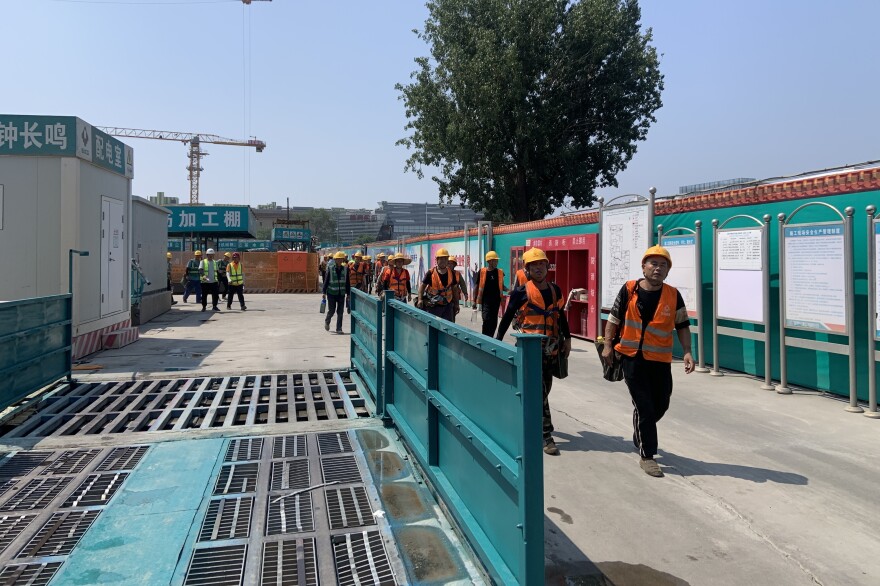About 30 years ago, construction worker Song Aimin believed a lifetime of labor could earn him a spot among China's growing urban middle class. He left his village in the northern Hebei province and headed to Beijing.
"Back then, all the people in the villages wanted to leave to go find work in the cities. Laboring in the cities meant that you always ate well — at least, better than you ate back home," says Song, now 64 years old. "Everyone went to the cities to make money and to improve their lives."
Song is among the country's estimated 300 million migrant workers who moved from one region of China to another seeking employment. Their labor helped propel China's growth in the past four decades, flowing into booming cities when their labor was needed.
Now, these workers are approaching retirement age, and China must deal with the costs of supporting an aging workforce. Although they built much of the country's infrastructure, migrant workers remain the most vulnerable in the country's fast-aging workforce.
Rules passed in 2022 prevent men over age 60 from working on construction sites. But after decades of informal work, they have little savings or formal pensions to fall back on.
"Of course I would like to retire. But I have got to think of ways to make money first. In these days, you cannot survive without money," says Liu Zhongxian, 58, who moved from his home in Hebei province to Beijing in his early 20s. He has now become a construction site manager and is contemplating retirement but has no health care benefits or pension.

China's population is aging
Chinese government statistics show nearly 30% of migrant workers are 50 years old and above — almost 90 million workers in total. (The official retirement age for men in China is 60 and as young as 50 for blue-collar work for women.)
This mirrors the rest of China: It is aging much faster than babies are being born. That means fewer new workers. An older population is also stretching China's state pension funds and will pressure its health care system. Among this population are the country's migrant workers.
Starting in the 1980s, nearly 300 million workers like Liu flocked from the countryside into big cities.
"And so began what is often described as one of the greatest human migrations of all time, as hundreds of millions of young men and women from the countryside poured into the factories and construction sites of China's coastal boom cities," says Lu Zhang, a sociology professor at Temple University in Philadelphia.
These workers mostly filled low-paying jobs. About a fifth of migrant workers are in the construction sector, and they worked hard.
Many of Beijing's construction workers, including Liu and Song, hail from a beltway of small villages a three-hour drive from the capital. Liu says he left home in the 1990s after a fellow villager introduced him to a construction crew in the city. "It was like that," he remembers. "One person bringing the next into the cities."

At first, young men — and later, their families — began moving into China's booming cities. "In 1995, more than half of [the migrant workers] were in their 20s. The numbers were so huge and increasing all the year," says Dorothy Solinger, a professor emeritus of political science at the University of California, Irvine. "Those people now would be in their 60s and 70s."
The country's most recent migrant worker demographic survey shows just undera quarter of migrant workers currently have some kind of pension or medical insurance.
One of the major reasons for this is that rural migrant workers and their children were long denied social benefits, a legacy of residency rules that link social services and publicly funded benefits to where a person is legally registered to live, even when people move for work.
Less work, no pension
Smaller cities have been loosening rigid migration controls for the last decade by offering more access to education and health care to workers and their children from other parts of the country. However, many workers never had formal employment, or they worked for subcontractors who simply ignored their legal obligations to pay social insurance for employees.
"This kind of very complicated or indirect form of employment will ultimately limit the claims," says Jenny Chan, a sociology professor who studies labor policy at the Hong Kong Polytechnic University. "Many of them may not have the stable income in terms of pensions, and given the high cost of living in the cities, they will have a lot of anxiety when they are getting old, and when they are ill."
Adding to their woes is the biggest real estate slowdown in China's history. The central government has been forcing developers and local governments to pay back debts to state creditors, resulting in fewer projects and less work for construction workers.
Outside Beijing, another construction worker, Wang, is doing odd jobs in his hometown in Hebei province. He only gave NPR his last name to avoid being fully identified because of the sensitivity in China of speaking with foreign media.
He's now 68 years old, making him too old for construction companies to employ. A state pension plan gives him only about $20 a month.
He is living in a modest brick hut he built himself. He says his ambitions of making it into the middle class are over.
"I can still move for another five years at least," he says. "I will continue working until I cannot move anymore."
Emily Feng reported this story from Taipei, Taiwan. Aowen Cao contributed research from Beijing, China.
Copyright 2024 NPR. To see more, visit https://www.npr.org.




